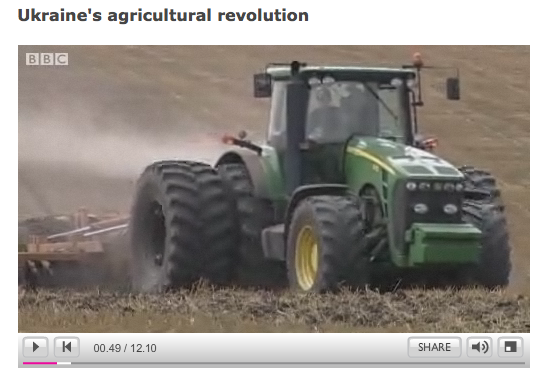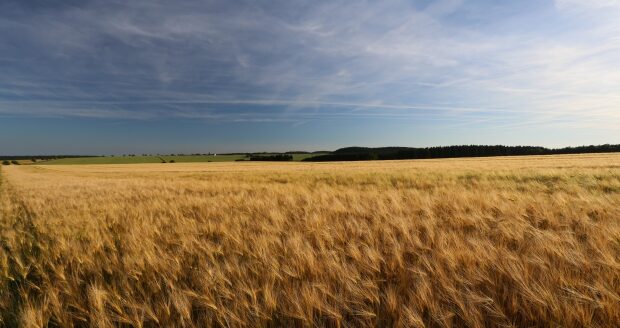Since 2007/08, the world has lived with substantially higher, if fluctuating, prices for grains following the global food price spike that began in 2007. Economists would predict that higher prices would lead to a global supply response. Indeed, global cereals production has increased by over 500 million tonnes in 2013 compared to 2006 production of just over 2 billion tonnes (FAOSTAT statistics are used throughout this post, and cereals production is measured inclusive of the volume of milled rice). This corresponds to an increase of 25% over this period, or a compound annual growth rate of 3.3% per annum which is impressive.… Read the rest
EU farmers drive Ukraine’s agricultural revolution
Earlier this week BBC’s Newsnight aired an extended feature on how overseas farmers are bringing the investment that’s transforming Ukraine’s agriculture into vast arable mega-farms. There is no doubt that Ukraine, with its vast expanses of fertile land, has the potential to make a valuable contribution to the global supply of food. Let’s hope they avoid the mistakes made in industrial monoculture farming elsewhere in the world. And that some of the profits that are being made end up in the hands of ordinary Ukrainians.
EU farmers drive Ukraine's agricultural revolution
Earlier this week BBC’s Newsnight aired an extended feature on how overseas farmers are bringing the investment that’s transforming Ukraine’s agriculture into vast arable mega-farms. There is no doubt that Ukraine, with its vast expanses of fertile land, has the potential to make a valuable contribution to the global supply of food. Let’s hope they avoid the mistakes made in industrial monoculture farming elsewhere in the world. And that some of the profits that are being made end up in the hands of ordinary Ukrainians.
View the feature here
 … Read the rest
… Read the rest
Trends on the EU rice market
There was a fundamental reform of the EU rice market in 2003. The intervention price was cut in half to bring it down to the (then) level of the world prices, and producers were compensated by an increase in direct payments. An important impetus for this reform lay in the market opening offer by the EU to least developed countries (LDCs) under the Everything But Arms agreement which promised duty-free and quota-free access for rice imports from LDCs from September 2009.
Few LDCs are net exporters of rice. However, it was feared that LDCs might export, in line with the rules of origin, the totality of their domestic rice production to the EU, while importing their domestic consumption requirements from the world market.… Read the rest
UK wheat can compete – so does it need subsidies?
Russia and Romania may be two of the cheapest places in the world to produce wheat, but the UK is only a little way behind. Releasing the result of its Global Cost of Production Challenge, Bidwells Agriculture head of research Carl Atkin, said that despite the higher unit price of inputs in the UK, cost of production per tonne is only marginally higher than in eastern Europe. ‘This is because of the considerable yield advantage the UK has, based on first-class soils and a maritime climate.’… Read the rest
UK wheat can compete – so does it need subsidies?
Russia and Romania may be two of the cheapest places in the world to produce wheat, but the UK is only a little way behind. Releasing the result of its Global Cost of Production Challenge, Bidwells Agriculture head of research Carl Atkin, said that despite the higher unit price of inputs in the UK, cost of production per tonne is only marginally higher than in eastern Europe. ‘This is because of the considerable yield advantage the UK has, based on first-class soils and a maritime climate.’… Read the rest
US farmers want out of conservation, environmentalists resist
The current high prices for arable crops mean that farmers in the US and Europe are reconsidering whether putting their land into government-financed conservation schemes is such a good idea financially. The EU is well on the way to releasing all its set aside land back into production, and in the US Congress is considering whether to allow farmers to leave long term conservation contracts without facing any penalties. … Read the rest
The mixed up world of US Senator Chuck Grassley
We all know that the legislators who write US farm policy are not the brightest bulbs in the box. Even so, Senator Chuck Grassley treated us to an unusual insight into his own very special, mixed-up world during a telephone press briefing last week, reported in the Des Moines Register. Asked about the contribution of the US Government’s massive food-to-fuel subsidies to rising world food prices and the resulting hunger, poverty and social unrest, Grassley denied there was any connection and suggested the responsibility lay with people in China eating too much meat.… Read the rest
Set-aside: ensuring the environmental benefits
Ariel Brunner in a recent post lamented the fact that the EU has proposed to set the rate of compulsory set-aside to 0% for the 2008 harvest without putting in place alternative measures to secure the environmental benefits which set-aside land provides. The reason why the decision only concerns autumn 2007 and spring 2008 sowings is that a decision to eliminate set-aside can only be done in the context of a global review of arable crops policy. This will be undertaken as part of the CAP Health Check, when the Commission has promised an analysis on how and by which means we can address the positive environmental side effects of set aside.… Read the rest
Set aside: act now, think later…
Following a Swedish proposal and widespread support in the Agriculture Council, the Commission announced the intention to set the level of compulsory set aside at 0% for the 2008 harvest. This is bad news for Europe’s wildlife and suggests a disappointing level of commitment to environmental sustainability on the side of the EU and its Member States. It also seems like a textbook case of ill conceived decision making. … Read the rest

